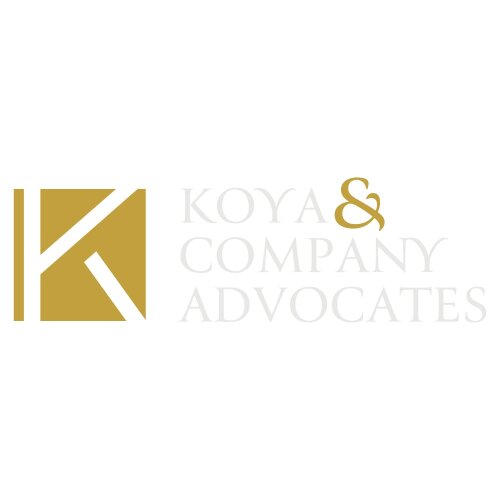Best Employer Lawyers in Nairobi
Share your needs with us, get contacted by law firms.
Free. Takes 2 min.
List of the best lawyers in Nairobi, Kenya
Legal guides written by Adroit Law LLP:
- Kenya Launches Digital Nomad Visa: A Gateway for Remote Workers
- Navigating the Payment System License Maze in Kenya
- Navigating the Complexities of Mining Licenses and Permits in Kenya: A Look into Artisanal and Large-Scale Operations
Kenya Employer Legal Articles
Browse our 1 legal article about Employer in Kenya written by expert lawyers.
- Understanding Kenyan Employment Law: A Guide for Small Businesses
- Kenya's vibrant small business ecosystem is a critical driver of the country's economic growth, but navigating the complex landscape of employment law can be challenging for entrepreneurs. Whether you're a local startup founder or a foreign investor looking to establish a business in Kenya, understanding the legal framework surrounding employment... Read more →
About Employer Law in Nairobi, Kenya
Employer law in Nairobi, Kenya is governed by a combination of statutes, regulations, and judicial decisions that regulate employment relationships. The primary legislation is the Employment Act, 2007, which addresses key aspects such as contracts, wages, working hours, leave, and termination of employment. Other relevant laws include the Labour Relations Act, the Occupational Safety and Health Act, and the Work Injury Benefits Act. Understanding these laws is crucial for both employers and employees to ensure compliance and protect their rights.
Why You May Need a Lawyer
There are several scenarios where individuals may seek legal assistance in employer-related matters. Disputes over wrongful termination, harassment, discrimination, non-payment of wages, or breaches of employment contracts are common issues. Employers may also need legal advice to ensure compliance with labour laws, during negotiations with unions, or when drafting employment contracts. A lawyer can provide guidance, represent clients in disputes, and help navigate through complex legal procedures.
Local Laws Overview
In Nairobi, Kenya, several local laws impact employer and employee relations. The Employment Act outlines the fundamental rights and duties of both parties, including requirements for written contracts, safe working environments, and fair remuneration. The Labour Relations Act covers the formation of unions, collective bargaining, and industrial actions. The Occupational Safety and Health Act mandates standards for safe workplaces, while the Work Injury Benefits Act provides for compensation in case of workplace injuries. Employers must stay informed about these regulations to avoid legal penalties and foster positive work environments.
Frequently Asked Questions
What are the standard working hours in Nairobi?
The standard working hours are typically 8 hours a day or 48 hours a week, excluding overtime, which should be compensated as per the Employment Act.
Can an employer terminate an employee without notice?
No, termination without notice is only permissible in cases of gross misconduct. Otherwise, appropriate notice or payment in lieu is required by law.
Are employees entitled to annual leave?
Yes, employees in Nairobi are entitled to a minimum of 21 days of annual leave after completing 12 consecutive months of service.
Is it mandatory to provide a written employment contract?
Yes, the employer is required to give an employee a written contract within two months of employment, indicating terms and conditions.
What is the minimum wage in Nairobi?
The minimum wage varies depending on the job and industry, with rates set by the government and updated periodically. Employers must ensure compliance with the latest gazetted minimum wage rates.
How should employers handle workplace harassment complaints?
Employers are responsible for establishing procedures to handle harassment complaints, including conducting investigations and taking corrective actions to maintain a safe workplace.
What are the penalties for non-compliance with employment laws?
Penalties for non-compliance may include fines, legal actions, and compensation payments. Employers may also face reputational damage and strained employee relations.
Can an employee be forced to work overtime?
Overtime should be consensual, and employees must be compensated at a rate not less than one and one-half times the regular hourly rate.
What is the procedure for resolving employment disputes?
Employment disputes can be resolved through mediation, conciliation, or litigation. The first step is often seeking resolution through the Labour Office.
Are employees entitled to maternity leave?
Yes, female employees are entitled to three months of maternity leave with full pay.
Additional Resources
For further assistance, individuals can contact governmental bodies such as the Ministry of Labour and Social Protection, the National Employment Authority, and the Federation of Kenya Employers. Non-governmental organizations like the Kenya Human Rights Commission and various trade unions can also offer support and guidance.
Next Steps
If you require legal assistance, consider consulting with an experienced employment lawyer in Nairobi. Begin by gathering all relevant information and documents related to your issue, then schedule a consultation to discuss your case. A lawyer can assess your situation, provide expert advice, and represent you in legal proceedings if necessary.
Lawzana helps you find the best lawyers and law firms in Nairobi through a curated and pre-screened list of qualified legal professionals. Our platform offers rankings and detailed profiles of attorneys and law firms, allowing you to compare based on practice areas, including Employer, experience, and client feedback.
Each profile includes a description of the firm's areas of practice, client reviews, team members and partners, year of establishment, spoken languages, office locations, contact information, social media presence, and any published articles or resources. Most firms on our platform speak English and are experienced in both local and international legal matters.
Get a quote from top-rated law firms in Nairobi, Kenya — quickly, securely, and without unnecessary hassle.
Disclaimer:
The information provided on this page is for general informational purposes only and does not constitute legal advice. While we strive to ensure the accuracy and relevance of the content, legal information may change over time, and interpretations of the law can vary. You should always consult with a qualified legal professional for advice specific to your situation.
We disclaim all liability for actions taken or not taken based on the content of this page. If you believe any information is incorrect or outdated, please contact us, and we will review and update it where appropriate.

















